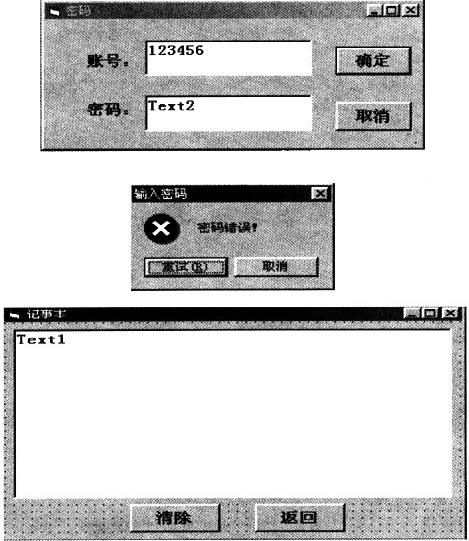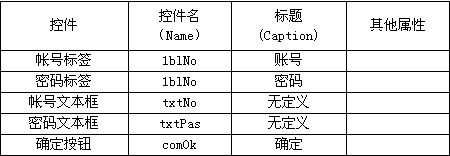软件水平考试(初级)程序员下午(应用技术)模拟试卷6
-
阅读以下说明和C++代码,将解答写入对应栏内。
【说明】
请编写一个函数int SeqSearch(int list[],int start,int n,int key),该函数从start开始,在大小为n的数组list中查找key值,返回最先找到的key值的位置,如果没有找到则返回-1。请修改程序中画线部分的错误并将不同情况下的输出结果补充完整。
【程序】
文件search.cpp的内容如下:
#include <iostream. h >
int SeqSearch( int list[ ] ,int start,int n,int key)
{
for(int i=start;i<=n;i++) //(1)
{
if( list[i] = key)//(2)
{
return i;
}
}
return -1;
}
void main( )
{
int A[10]
int key,count=0,pos;
cout <<" Enter a list of 10 integers:";
for(pos=0;pos<10;pos++)
{
cin >>A; //(3)
}
cout <<" Enter a key; ";
cin >> key;
pos=0;
while(( pos = SeqSearch ( A, pos, 10, key)) !=-1 )
{
count ++;
pos ++;
}
cout<<key<<"occurs" <<count<< (count!=1?" times":" time") <<" in the list,"
<< endl;
}
第一种情况:输入2 3 12 6 8 45 8 33 7输入key:8
输出:(4)
第二种情况:输入2 3 126 8 45 8 33 7输入k6y:9
输出:(5)
-
阅读以下说明和Java代码,将应填入(n)处的字句写在对应栏内。
[说明]
编写一个字符界面的Java Application 程序,接受用户输入的10个整数,并输出这10个整数的最大值和最小值。
[Java 代码]
import java. io.* ;
public class abc
{
public static void main ((1))
{int i, n=10, max=0, min=0, temp=0;
try {
BufferedReader br = new BufferedReader (
new InputStreamReader ( System.in ) );
max = min =Integer. parselnt ( br. readLine ( ) );
}. (2) ( IOExccption e ) {} ;
for ( i=2 ; i<=n ; i++ ) {
try {
BufferedReader br = new (3) (
new InputStreamReader ( System. in ) );
temp =(4) ( br. readLine ( ));
if (temp>max ) max=temp;
if (temp<min) (5)
} catch (IOException e ) {};
}
System.out.println ( "max="+max+"\nmin="+min );
}
}
-
阅读以下说明及Visual Basic 程序代码,将应填入(n)处的字句写在对应栏内。
[说明]
以下是一账号和密码输入的检验程序。对输入的账号和密码规定如下所述。
(1)账号为不超过6位的数字,密码为4位字符,在本题中,密码假定为“Pass”。
(2)密码输入时在屏幕上不显示输入的字符,而以“*”代替。
(3)当输入不正确,如账号为非数字字符或密码不正确时,显示有关信息。
(4)当输入正确时,关闭密码窗口,显示记事本窗口。
按要求完成有关控件的其他属性的设置,编写确定按钮的单击事件过程。相关界面如下:

(可能要用到的单词:MultiLlne,ScrollBars,PasswordChar,MaxLength)密码窗口frmPass控件设置如下表所示。

记事本窗口frmNotepad 控件设置如下表所示。

在密码窗口的属性窗口,对密码文本框设置属性MuniLine 为False。
[Visual Basic 代码]
Private Sub cmd OK_ Click ( )
If txtPas. Text= "Pass" Then
Load frmNotePad
frmNotePad. Show
frmPass.Hide
Else
MsgBox "密码错误! ", vbExclamation + vbRetryCancel, "重输入密码"
txtPas. Text= " "
txtPas. SetFocus
(1)
End Sub
Private Sub Form_ Load ( )
txtPas.PasswordChar = "*"
xtNo.MaxLength = 6
End Sub
Private Sub txtNo LostFocus (
Dim i As Integer, s As String * 1
Fori= 1 To (2)
s = Mid ( txtNo.Text, i, 1 )
If (3) Or (4) Then
MsgBox "账号有非数字符号! ", vbExclamation + vbRetryCancel, "1 输入账号"
(5)
txtNo. SetFocus
Exit Sub
End If
Next i
End Sub
-
阅读以下程序说明和C程序,将应填入(n)处的子句,写在对应栏内。
【程序说明】
函数int commstr(char * str1,char * str2,int * sublen)从两已知字符串str1和str2中,找出它们的所有最长的公共子串。如果最长公共子串不止1个,函数将把它们全部找出并输出。约定空串不作为公共子串。
函数将最长公共子串的长度送入由参数sublen所指的变量中,并返回字符串str1和str2的最长公共子串的个数。如果字符串str1和str2没有公共子串,约定最长公共子串的个数和最长公共子串的长度均为0。
【程序】
int strlen(char * s)
{char *t=s;
while( * ++);
return t-s-1;
}
int commstr(char) *str1,char *str2,int *sublen
{ char*s1, *s2;
int count=0,len1 ,len2,k,j,i,p;
len1:=strlen(str1)
len2 = strlen(str2);
if(len1>len2)
{s1=str1 ;s2=str2;}
else {len2 = len1;s1 = str2;s2 = str1;}
for(j=len2;j>0;j--) /*从可能最长子串开始寻找*/
{for(k=0;(1)<:len2;k++) /*k为子串s2的开始位置*/
{for(i=0;s1[(2)]!='\0';i++;) /*i为子串s1的开始位置*/
{ /*s1的子串与s2的子串比较*/
for (p=0;p<j)&&(3);p++);
if ((4)) /*如果两子串相同*/
{for(p=0);p<j;p++} /*输出子串*/
printf ("%c",s2[k+p]);
printf ("\n");
count++;/*计数增1 */
}
}
}
if (count>0) break;
*sublen=(count>0)?(5):0;
return count;
}
-
阅读以下说明及Visual Basic 程序代码,将应填入(n)处的字句写在对应栏内。
[说明]
本程序求3~100之间的所有素数(质数)并统计个数;同时将这些素数从小到大依次写入顺序文件E: \dataout.txt;素数的个数显示在窗体Form1上。
[Visual Basic 代码]
Private Sub Command1_ Click ( )
Dim count as integer, flag as Boolean
Dim t1 as Integer, t2 as Integer
(1)
Count=0
For t1=3 to 100
Flag=Tree
For t2=2 to Int( Sqr ( t1 ) )
If (2) Then flag=False
Next t2
(3)
count=(4)
write #1, t1
End if
Next t1
(5)
Close #1
End Sub
-
阅读下列函数说明和C代码,将应填入(n)处的字句写在对应栏内。
【说明】
设有一个带表头结点的双向循环链表L,每个结点有4个数据成员:指向前驱结点的指针prior、指向后继结点的指针next、存放数据的成员data和访问频度freq。所有结点的freq初始时都为0。每当在链表上进行一次L.Locate(x)操作时,令元素值x的结点的访问频度 freq加1,并将该结点前移,链接到现它的访问频度相等的结点后面,使得链表中所有结点保持按访问频度递减的顺序排列,以使频繁访问的结点总是靠近表头。
【函数】
void Locate( int &x)
{ <结点类型说明>
* p =first -> next;
while(p!=frist&&(1))P=P->next;
if(p! =first) /*链表中存在x*/
{(2);
<结点类型说明>
* current = P; /*从链表中摘下这个结点*/
Current -> prior -> next = current -> next;
Current -> next -> prior = current -> prior;
P = current -> prior; /*寻找重新插入的位置*/
While(p! =first &&(3))p=p->prior;
Current-> next =(4); /*插入在P之后*?
Current -> prior = P;
P -> next -> prior = current;
P->next=(5);
}
else printf("Sorry. Not find! \n"); /*没找到*/
}
-
阅读下列函数说明和C代码,将应填入(n)处的字句写在对应栏内。
【说明】
函数QuickSort是在一维数组A[n]上进行快速排序的递归算法。
【函数】
void QuickSort( int A[ ],int s,int t)
{ int i=s,j=t+1,temp;
int x=A[s];
do{
do i ++ ;while (1);
do j -- ;while(A[j]>x);
if(i<j){temp=A[i];(2);(3);}
}while(i<j);
A[a] =A[j];A[j] =x;
if(s<i-1) (4);
if(j+1<t) (5);
}
-
阅读下列函数说明和C函数,将应填入(n)处的字句写在对应栏内。
【函数2.1说明】
函数palindrome(char s[])的功能是,判断字符串s是否为回文字符串,若是,则返回0,否则返回-1。若一个字符串顺读和倒读都一样时,称该字符串是回文字符串,例如:“LEVEL”是回文字符串,而“LEVAL”不是。
【函数2.1】
int palindrome( char s[ ] )
{ char * pi, * pj;
pi=s; pj=s+strlen(s)-1;
while( pi<pj&&(1)){
pi ++ ;pj --
}
if((2))return -1;
else return 0;
}
【函数2.2说明】
函数f(char * str,char del)的功能是:将非空字符串str分割成若干个子字符串并输出,del表示分割时的标志字符。
例如若str的值为“33123333435”,del的值为“3”,调用此函数后,将输出3个子字符串,分别为“12”、“4”和“5”。
【函数2.2】
void f( char * str, char del)
{ int i ,j ,len;
len = strlen (str)
i=0;
while(i < len) {
while((3))i++; /*忽略连续的标志字符*/
/*寻找从str[i]开始直到标志字符出现的一个子字符串*/
j=i+1;
while(str[j] != del && str[j] ! = '\0')j ++
(4): '\0'; /*给找到的字符序列置字符串结束标志*/
printf("%s\t",&str[i]);
(5);
}
}


